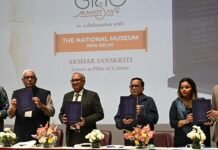
New Delhi-based book printer Sai Printo Pack recently installed an RMGT 920ST-4 printing press supplied by Provin Technos. This is the company’s third RMGT press within seven years – the first RMGT 920ST-4 25×36-inch press was installed in April 2017 and the second in December 2019. The newest and third press has been installed at Sai Printo Pack’s Noida Sector 140 plant, where the second machine is located.
Naresh Chandna, director of Sai Printo Pack, said the RMGT consumes less power and has improved productivity. “Getting multiple machines from the same manufacturer helps as it solves the problem of keeping an inventory of offset plates of different sizes and also the interchangeability of presses. We wanted machines with a single plate size so that there is no problem in printing in either location, whether in Noida or Okhla,” he said.
With 40 years of experience in the commercial printing industry, Chandna set up his first plant in the Okhla Phase 2 Industrial Area in the year 2000. The area of 20,000 square feet was spread across different floors. The single-floor Noida plant, has 25,000 square feet, and was inaugurated in 2019.
Chandna’s son Himanshu joined him in 2015. “It is a matter of great satisfaction for a commercial printer when the next generation willingly joins the business. Himanshu manages nearly 90% of our printing operations,” Chandna says with pride.
Sai Printo Pack specializes in commercial printing jobs for leading educational publishers. Apart from Pearson, McGraw Hill India, Headword Publishing and Sage Publications for educational books, children’s books for Scholastic India, and fiction titles for Rupa Publications, it has also been printing scientific and medical books for Elsevier. The printer has been felicitated with a lifetime achievement award from Punjabi Mahasabha in New Delhi.
Law and taxation books
The printer specializes in law books for publishers based in and around the Delhi-NCR. It prints law books for the Supreme Court, the High Court and lower courts along with books on the IPC, and the CRPC.
It has produced a few 3,000-page, 4-inch thick, single-volume hardbound books such as MP Jain’s Indian Constitutional Law by Justice Jasti Chelameswar and Justice Dama Seshadri Naidu for LexisNexis, Copinger and Skone James on Copyright by Gillian Davies, Nicholas Caddick and Gwilym Harbottle for Sweet & Maxwell, and Direct Taxes – Law & Practice by Dr Girish Ahuja and Dr Ravi Gupta for Commercial Law Publishers (India).
For the Sharadiya Navratri from 15-23 October 2023, Sai Printo Pack printed the book Mata Vaishno Devi: The Bhakti of Shakti for Rupa Publications. The books with yatra-related information were distributed free to VIP visitors at the Vaishno Devi shrine in Katra by the temple board. Sai Printo Pack also prints books for Radha Soami Satsang Beas and Shree Ram Sharnam.
The Okhla plant is entirely focused on law books, Chandna tells Indian Printer & Publisher. “We have printed and bound a 3,400-page single-volume book for a law publisher. We can bind paperbacks up to four inches thick. We can produce approximately 30,000 4-color textbooks of 200 pages each in a single day at our plant.”
Sai Printo Pack has kept its bindery setup strong with three Aster 180 sewing machines, two Welbound and Electromec six-clamp perfect binding machines and four Stahl folding machines. The company has a lamination setup at both plants as well. Apart from this, the company has three used Ryobi 680ST-4 4-color presses.
After the pandemic setback of 2021-22, Sai Printo Pack’s printing operations are back on track. Business is set to increase after the lull, Chandna said with optimism, adding he ordered the new machine after observing an uptick in the printing business.
Chandna said 85-90% of his 4-color printing is for academic and school books. Printing of books for the upcoming academic session beginning in April starts from October and the company is focused on that at present.
Paper cost is the biggest challenge in the commercial printing business, he said, adding prices have fluctuated a lot in the last year. On average, the company is procuring paper at Rs 80-85 per kilogram at present. “After the Covid-19 pandemic, the concept of credit period is over. But it is not a problem for good paymasters. Any printer offering quality and service to publishers will never face any challenge,” he said.
Chandna has kept specific vehicles for transportation and doesn’t face any major issues in shipping consignments to Daryaganj, Noida, Gurugram and Sonepat. He plans to enter the book export business in the coming years and wants to move the entire printing operations to the Noida plant.
















